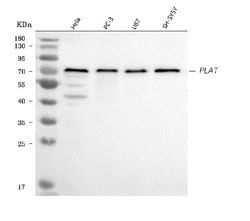Learn More
Invitrogen™ tPA Polyclonal Antibody


Rabbit Polyclonal Antibody
Supplier: Invitrogen™ PA595234
Description
Human TPA shares 83% and 84% amino acid (aa) sequence identity with mouse and rat TPA, respectively. Reconstitute with 0.2 mL of distilled water to yield a concentration of 500 μg/mL. Positive Control - WB: human Hela whole cell, human PC-3 whole cell, human U87 whole cell, human SH-SY5Y whole cell. Store at -20°C for one year from date of receipt. After reconstitution, at 4°C for one month. It can also be aliquotted and stored frozen at -20°C for six months. Avoid repeated freeze-thaw cycles.
TPA converts the abundant, but inactive, zymogen plasminogen to plasmin by hydrolyzing a single Arg-Val bond in plasminogen. By controlling plasmin-mediated proteolysis, it plays an important role in tissue remodeling and degradation, in cell migration and many other physio pathological events. It specifically cleaves the Arg- -Val bond in plasminogen to form plasmin, and is comprised of a heterodimer of chain A and chain B held by a disulfide bond. TPA binds to fibrin with high affinity. This interaction leads to an increase in the catalytic efficiency of the enzyme between 100-and 1000-fold, due to an increase in affinity for plasminogen. Similarly, binding to heparin increases the activation of plasminogen. Binding to laminin and fibronectin has also been demonstrated. TPA also binds to mannose receptor and the low-density lipoprotein receptor-related protein (LRP1). These proteins are involved in TPA clearance. TPA binds to annexin II and to cytokeratin 8. As yet unidentified interactions on endothelial cells and vascular smooth muscle cells (VSMC) lead to a 100-fold stimulation of plasminogen activation. In addition, binding to VSMC reduces TPA inhibition by PAI-1 by 30-fold.
Specifications
| tPA | |
| Polyclonal | |
| Unconjugated | |
| PLAT | |
| 3.4.21.68; Alteplase; AU020998; AW212668; D8Ertd2e; PATISS; plasminogen activator, tissue; plasminogen activator, tissue type; plasminogen/activator kringle; PLAT; Reteplase; serine protease; t plasminogen activator; tissue plasminogen activator; tissue-type plasminogen activator; Tissue-type plasminogen activator chain A; Tissue-type plasminogen activator chain B; TPA; t-PA; t-plasminogen activator | |
| Rabbit | |
| Affinity chromatography | |
| RUO | |
| 5327 | |
| -20°C | |
| Lyophilized |
| Western Blot | |
| 500 μg/mL | |
| PBS with 5mg BSA and 0.05mg sodium azide | |
| P00750 | |
| PLAT | |
| E.coli-derived human TPA recombinant protein (Position: H366-P562). | |
| 100 μg | |
| Primary | |
| Human | |
| Antibody | |
| IgG |
Safety and Handling
Your input is important to us. Please complete this form to provide feedback related to the content on this product.
